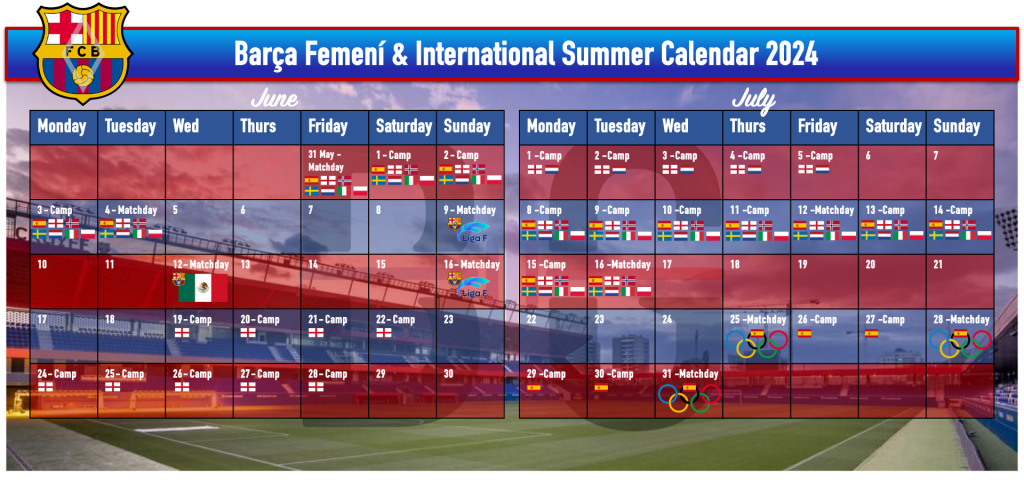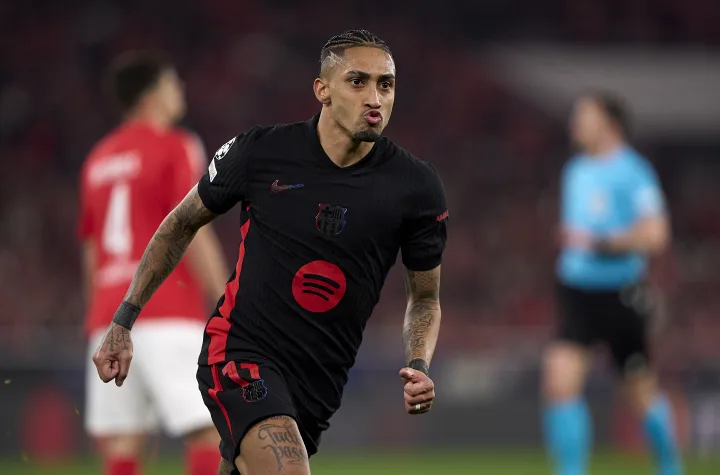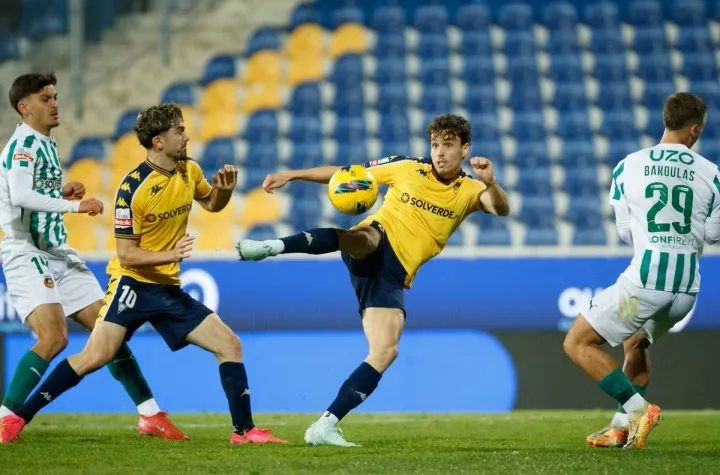
Beatriz Álvarez / Getty Images
In the current international window, 18 Barça Femení players have been called into service – including Ona Batlle and Aitana Bonmatí, already released from the Spain squad injured, and Bruna Vilamala, called up to replace Aitana; Esmee Brugts, who was taken off with discomfort in the Netherlands’ match on Friday; and Vicky López, who will return to Barcelona during the squad camp to sit the Selectividad.
And this is just the start of an overworked summer.

FIFA recently approved the new women’s international calendar, which has already been widely criticised for focusing more on growing the presence of the game than on the safety of the players. Still, FIFA has received the smallest grain of praise for “compromising” in its plan to, apparently, be even more driven by improvement-on-paper: the football overlords have cut out one of the international windows altogether, albeit by adding more games to some windows, ensuring just as many matches are played.
But at least the perennial question of how long a break players need between club and international fixtures, especially those involving travel, will only get asked five times a year(!)
In making this symbolic concession, FIFA has paid attention to at least one of the things that representative groups have been pushing to get considered when planning schedules. But there’s many things that don’t seem to have been considered, and a whole group that FIFA has ignored entirely.

Ahead of FIFA announcing the new calendar, the Women’s League Forum – with Liga F president Beatriz Alvarez on its board – asked FIFA to be consulted on the schedule, but was denied the opportunity. The Women’s League Forum represents multiple women’s top flight leagues, with many of these being summer leagues – those that typically play through a single calendar year.
Maybe this was a reason FIFA denied the group a chance for its voice to be heard, with the international match calendar generally designed for winter leagues. Of course, the Liga F is a winter league. It also has a different schedule to England’s WSL, the league that FIFA seems to have catered for based on the dates for the international windows specified this summer, at least.
The Liga F will be far from the only league to have their match dates not consulted when FIFA built in all these new international windows, but as one of the Big Five and a winter league featuring many international players, it is going to be one of the more important leagues that FIFA should have thought about for match and training clashes. It’s also the league that we unfortunately correctly predicted would experience these clashes – and their negative side effects – straight away.
When the Lionesses announced their squad for the windows this summer, they have even had to include the disclaimer that “players will join at different stages of this preparation phase based upon their club programme.” The English and German leagues wrapped up in the middle of May, and the Lionesses have structured training camps every few weeks over the next two months in order to keep players match fit for their Euros qualifying games.
Meanwhile, Barcelona Femení are set to play their last match on 16 June, by which point all of its internationals (i.e. most of the team) will have already spent 10 days with their countries, including two matches; have possibly gone to Mexico for the now-annual Camp3ones match that tellingly won’t fit elsewhere in the summer calendar; and be days out from another international window. And that’s without even considering that they already (unlike any other single team) played two cup finals in the back end of May.

If last summer’s Women’s World Cup is anything to go by, England is likely to be the most rigid of the international teams that feature Barça Femení players, and the team that has the most camps. But only because the FA has done its research on optimum rest and preparation time before and after leagues and international windows – ever since the Lionesses (led by recently-retired Steph Houghton and Barça’s own Lucy Bronze) stood up to their federation in 2017 to demand structural changes and a new coach, these fundamental improvements in player conditions seem to come naturally.
So it’s ironic, then, that one of the players who helped drive the improvements won’t get to experience them. No optimum preparation time for Bronze or teammate Keira Walsh, not through the fault of England or Barcelona, but because FIFA didn’t bother to check league calendars beforehand, even when offered.
Is it bad or good then that the RFEF still (and infamously) does not support its women’s team that well, so chances are the Spanish players (with a strong Barcelona presence) will have fewer days in international preparation than their English equivalents – at least until they’re hustled to the Olympic Games right after next month’s set of European international games.
In any case, having international players spread across camps for Spain, England, Norway, Sweden, the Netherlands, Italy and Poland, means that they’ll all come back with different loads and different cool-down period needs. Team planning for the Barcelona fixtures still to happen will be made all the harder – and potentially more injury-aggravating – because of this awkward and poorly-timed secondment happening right now.

One of those Barça Femení fixtures is that trip to Mexico. While England manager Sarina Wiegman has outright said she’d prefer players to stay in Europe during the jam-packed summer, Barça’s Mexican opponents want to see the blaugrana‘s star power in person after the Women’s World Cup last summer was cause for a mostly reserve side to play the 2023 Camp3onas Tour. And assistant coach Rafel Navarro recently confirmed to Chivas that the club is planning to have everyone available for the game on 12 June – midweek between two Liga F games, and sitting a week either side of two international camps.
Engaging with the team’s Mexican fans, who gave an incredibly warm welcome last year, and building finances through such a fixture, are both incredibly important for Barça Femení. But the fatigue is already setting in after the first match of the summer calendar, Barcelona potentially three players down, and compounding it with anything extra could test the squad depth that the sports management are working so hard to maintain. This incredible season may prove that Barça Femení’s resilience can see them win everything and stay the course even through injury crises, but with player welfare in mind, it seems unfair to push those limits every year. Clubs and national teams will each prioritise their own fixtures, so it is ultimately up to regulators like FIFA to consult with representatives of them all in order to preserve the safety and careers of the best (thus generally most-used) players. And Barcelona has a lot of those.





More articles
“I never imagined that Raphinha could reach Barcelona”
Jandro Orellana: “I hope Barcelona wins La Liga”
All Roads Lead To Lisbon